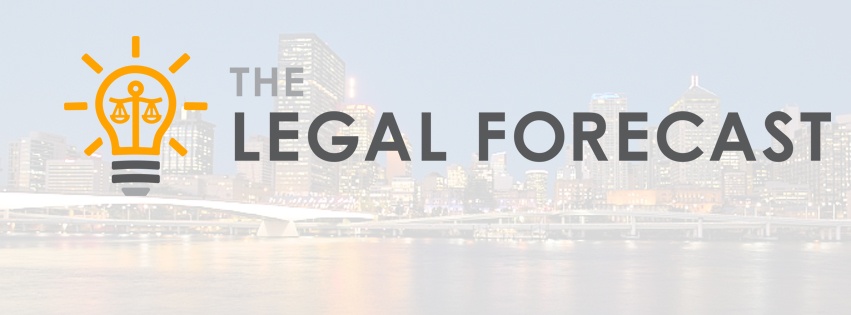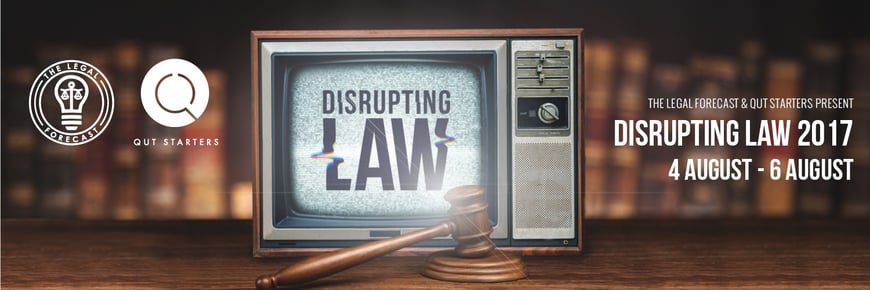Last week, Geordie Johnson (students / young lawyers (NZLSA) representative on the New Zealand Council of Legal Education; and also graduate at Russell McVeagh) shared his views on what matters to students and graduates when choosing where to work. This week, we hear from Milan Gandhi (founder and director of the Legal Forecast, a “not-for-profit run by early-career professionals who are passionate about disruptive thinking and access to justice”; and also research clerk at McCullough Robertson). The Legal Forecast is hosting a Disrupting Law event in August. which looks like a great initiative! I can't recall seeing anything like this in "my day", so things are clearly changing!
Milan Gandhi
Why did you choose to become a lawyer?
I was formerly a freelance filmmaker, and had graduated film school. At the time, I was shooting a lot of commercial and wedding videos to make money and was disillusioned owing to the repetitiveness and laboriousness of the job. I wanted to expand my horizons and learn about the world. I also wanted a challenge. Plus, I was inspired by my kind and brilliant late grandfather who had been a solicitor in Africa and who was unable to continue once migrating to England. Movies like To Kill a Mockingbird (1962), My Cousin Vinny (1992), Philadelphia (1993), and The Castle (1997) had painted a picture in my mind of the lawyer as a defender of the underdog – this appealed to me, and, I’m happy to admit (as naive as it may sound to a cynical few) that it continues to appeal to me! I am actually reading The Justice Game at the moment. It was of course written by one of the all-time greatest real-world defenders of underdogs, Mr Geoffrey Robertson QC – I highly recommend it!
Why did you choose to be a representative for law students and recent graduates?
I don’t necessarily represent or speak for law students/ recent graduates. In my role as National Director of The Legal Forecast, I do, however, answer to a group of very driven and talented individuals who are searching for better ways to “do law”. As The Legal Forecast’s representative on the Advisory Board to the Centre for Legal Innovation, I add perspectives in that forum which are inextricably tied to my uniquely “junior” view of the world (I say “uniquely” because my colleagues on the Board are profoundly experienced members of the profession/ industry). I do represent “law students and recent graduates” when fulfilling my role on the Board, but only because I myself am a law student and aim to speak my mind where appropriate. I doubt however that there are many fears and aspirations common to absolutely all law students. If anything, we are a notoriously argumentative bunch (as we perhaps should be!).
What do you think law students and recent graduates are now looking for when choosing where to work (or not)?
Again, I think it would differ from person-to-person. I know from experience, having worked at McCullough Robertson as a clerk for over 3 years now (and having rarely been disatisfied), that what ultimately matters most is the camaraderie and supportiveness of your colleagues and particularly your senior associates and partners. I am exceptionally lucky in that regard and will start as a graduate at McCullough in 2018.
Other things that no doubt matter include how much opportunity there is on a day to day basis to advance one’s skills through interesting new challenges, and whether the environment is one in which it is “okay” to ask a “stupid” question, and where a slip-up is met with warmth and constructiveness rather than derision.
One partner in particular who I work for (though they are all great) always has time for me, is genuinely interested in my interests outside of work (and only recently implored me to do some relaxing non-law reading in my spare time now that exams are over), and regularly gives me time off to pursue interesting opportunities. He also actively cares about the wellbeing of his juniors and has bought a copy of The Wellness Doctrines for every graduate in this year’s cohort (and gave me a copy on Friday).
The culture I am attempting to describe probably starts at the top (though it’s ultimately about the individuals involved). The managing partner, notwithstanding his presumably insane schedule, can regularly be heard joking with and chatting to juniors and never fails to say “hello” to me when he passes my desk. I don’t think I’ve ever seen him angry either (again, I’ve worked there for over 3 years).
This is me being as honest as possible and is not intended as a plug for my workplace – I’ve encountered the abovementioned positive signs in the two other firms I’ve had the pleasure of working for as a vacation clerk. The varied partners that take part in our annual legal hackathon, Disrupting Law, display many of these qualities and it’s the reason they come along to mentor contestants in the first place.
Can you rank them from most important to least important?
1. The supportiveness and, frankly, social intelligence of one’s seniors;
2. Whether the work is stimulating and challenging i.e. the opportunity for professional growth (the caveat being that a law firm is a business and therefore not everything can always be interesting); and
3. The parity between what one earns and one’s merits and responsibilities.
Where would understanding of disruption and use of technology fit into the equation?
The more a firm is willing to engage with better, more efficient ways of doing things, particularly where they relate to the automation of menial tasks, the more opportunities there are for juniors to spend their time on interesting and challenging (i.e. non-automatable) aspects of legal work. In other words, (2) (above) is more likely to be served where a junior is relieved from reviewing thousands of mundane, technical documents because a high-quality tech-assisted review (TAR) tool will now do this. The downside is that document review and other potentially automatable tasks previously created the job opportunities that allowed law students to become exposed to life in a law firm. 3 years ago, if someone had found a talented, inexpensive robot to review documents, I might never have gotten my start at a law firm.
What advice would you give to college students thinking about studying law or choosing where to work?
Make sure you’re entering law because at some level you’re genuinely interested in it… if you’re just in it for the money or because you have some fantasy regarding the prestigiousness of studying law, you’re in for a brutal, uphill battle. It’s not worth the anxiety and stress – let me tell you.
When I was in film school they used to say the same thing about setting out to become a film director – there are those who are directors and then there are those who just like the idea of being a director. The latter leave the “game” fairly quickly.
What do you think the legal profession will look like in 10 years?
My view is that it’ll be more tech-infused, diverse and multidisciplinary. It’ll be these things by necessity (not necessarily by choice). I also think it will be smaller and the concept of what is actually “legal work” will be more diffuse such that non-lawyers will offer services that were traditionally thought of as “legal” services. Everything I am describing is already visible to some extent. Being pragmatic, I don’t think the shift will be tectonic within 10 years’ time. It will of course vary from jurisdiction to jurisdiction depending on factors like the accessibility of technology, political and economic realities, cultural realities, and the shifting and unique needs of myriad clients. Though I am a part of an organisation called The Legal Forecast, I am the first to admit that actually forecasting the future of the legal profession is particularly tricky given the magnitude of variables. Be skeptical of those who are overly certain of their predictions – they are usually trying to sell something (a book or a software tool). That said, just because it’s a difficult topic, doesn’t make it any less worthwhile to ponder. I think my colleagues and I, who are just now embarking on our legal careers, should consider very carefully what the future may hold simply because to do so will reveal gaps in what we were taught by others. We should proactively try and fill those gaps ourselves… this was one impetus behind the creation of The Legal Forecast.
Thanks Milan! If you didn't catch it, here are Geordie's responses. Next week, I'll summarise what I've learned from both Geordie and Milan.






